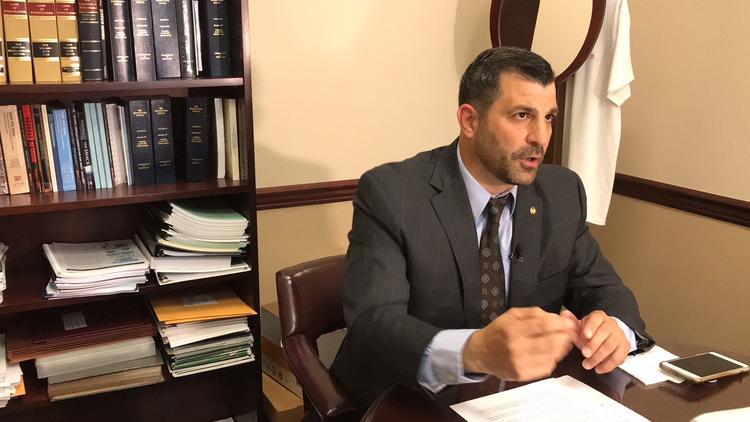|
Legislative support waning for bill giving adults more time to sue for childhood sex abuse
By Steve Esack
For more than two years, adults scarred by the memory of child sex abuse have sought personal and legal salvation in a pending state grand jury report about sexual misconduct and cover-ups in six Catholic dioceses across Pennsylvania. They believed that the report’s publication — now delayed by the state Supreme Court — would galvanize lawmakers to pass a bill letting them have their day in civil court, too. The goal is for the Legislature to pass a bill that will change how courts treat child sex abuse claims. They want the House and Senate to pass a bill that would lift the legal prohibition preventing adults 31 and older from retroactively suing their alleged abusers and enablers who didn’t report the crimes to authorities. But now support for retroactive lawsuits could be waning, according to the legislation’s prime sponsor, state Rep. Mark Rozzi, D-Berks, who says he was abused as a youth by a Catholic priest. Rozzi said House Speaker Mike Turzai has told him he no longer supports the legislation. Turzai did in 2016, when it passed the Republican-controlled House and then failed in the GOP-led Senate, where a majority of lawmakers viewed retroactive lawsuits as unconstitutional. The conversation, Rozzi said, occurred on the House floor during one of the last Capitol session days of the summer, around June 18-20. “Turzai called me up to the speaker stand and wanted to let me know he could not support the retroactivity anymore, the same bill we had passed before,” Rozzi said in a recent interview. “I was very disappointed, though, because he did support the legislation before, but now all of a sudden he can’t support the same legislation.” Turzai did not specify a reason, Rozzi said, adding: “I assume it’s political.” Rozzi pointed to campaign finance reports that show Turzai’s brief gubernatorial campaign, as well as his current House re-election campaign, were run by LN Consulting. That is the campaign wing of the Harrisburg lobbying and public relations firm Long, Nyquist & Associates. Long Nyquist is run by Mike Long and Todd Nyquist, who used to work for Senate Republicans. Among the 77 clients listed on the firm’s website is the Pennsylvania Catholic Conference. The Catholic Conference issued statements in 2016 opposing retroactive civil lawsuits while serving as the lobbying group for all the state’s Catholic dioceses. Turzai, an Allegheny County Republican, did not return a call or a text message left on his cellphone. Paul Engelkemier, newly hired spokesman for the speaker’s office, also did not return multiple requests for comment this week. Mike Long and Todd Nyquist did not respond to calls, either. Long Nyquist does not dictate the legislative agenda as Rozzi may believe, said Drew Crompton, chief of staff and counsel for Pennsylvania Senate Pro-Tempore Joe Scarnati, R-Jefferson. Crompton said Scarnati believes retroactive lawsuits would unfairly bankrupt Catholic dioceses and close schools, as evidenced by what has occurred in other states that permitted them. “Joe has taken this position regardless of whatever client Long Nyquist has,” Crompton said. “This is something he fervently believes in.” In addition, he said, court precedent supports Scarnati’s position. He pointed to a 1986 state Supreme Court ruling in an insurance case that said “legislation that purports to revive an expired claim violates the constitutional guarantee of “due course of law.’” “It was stunningly on point,” Crompton said. Current law gives child abuse victims until the age of 30 — or 12 years after adulthood — to sue for damages in civil court. Criminal charges can be brought until the victim turns 50. A bill permitting tougher civil and criminal penalties was the subject of heated debate in 2016. The debate started after then-Attorney General Kathleen Kane published a scathing grand jury report about abuse and cover-ups in the Altoona-Johnstown Diocese. The bill would have given some adults an additional 20 years to sue for past child abuse by upping the litigation time limit to age 50. The bill also erased the statute of limitations on future child sex abuse, meaning criminal charges could be brought any time after the alleged abuse occurred. In support of the bill, Rozzi gave emotional floor speeches describing his own abuse by an Allentown Diocese priest. The clergy also got involved. During Masses, priests, following orders of their diocesan bishops, criticized the bill and lawmakers who supported it. In April 2016, the bill passed the House. Two months later, Kane withdrew her support for it and sided with the Senate’s view that retroactive lawsuits were illegal. The Senate then stripped out the retroactive civil lawsuit part and sent the bill back to the House, which didn’t act. In February 2017, Scarnati led a renewed Senate push to pass a tough child sex abuse bill. His bill would abolish the criminal prosecution time limits on future child sex abuse cases. It also would remove civil lawsuit time limits, not retroactively but for future victims or victims who are not yet 30. Under the bill, they could sue abusers and anyone who may have covered up the abuse. The bill passed the Senate 48-0 on Feb. 1, 2017. Since then, it has sat in the House, where Turzai and other Republicans have deferred to Rozzi’s wishes to amend the Senate bill to allow retroactive lawsuits. House Majority Leader Dave Reed, R-Indiana, still supports Rozzi’s version, said his spokesman, Steve Miskin. But with Reed set to leave office in November, Turzai’s support would carry more weight. If the House amends the Senate bill, Crompton said, he didn’t think senators would go along with it. The Senate’s version, he said, could improve the lives of future victims without fear of the law being ruled unconstitutional by the courts. “In our opinion it is really disappointing this bill we passed a year and a half ago hasn’t been moved to the governor,” Crompton said. “We could greatly improve the landscape if we got this one.” Jennifer Storm, who runs the state Office of Victim Advocate, said Rozzi’s bill would be better for all victims. The current statute of limitations is arbitrary, she said. “I am hopeful the release of the report will rejuvenate everyone on the steps of the Capitol,” Storm said. “All of these survivors are time-barred.” The court-stalled grand jury report examined child sex abuse claims and cover-ups in the Allentown, Erie, Greensburg, Harrisburg, Pittsburgh and Scranton dioceses. Kane’s administration started it after finishing the Altoona-Johnstown grand jury report. Attorney General Josh Shapiro inherited the probe and was set to publish its findings. But the high court stepped in, ordering it kept under wraps until the court hears appeals from “many” people seeking to protect their constitutional right to a clean reputation and challenge the accusations against them in the report. On Friday, Shapiro announced he will appeal the court order on Monday. The court has not set a deadline to rule. The legislative session ends in November and Scarnati’s and Rozzi’s versions of the bills will die without approval by both chambers. Contact: sesack@mcall.com
|
.
Any original material on these pages is copyright © BishopAccountability.org 2004. Reproduce freely with attribution.

